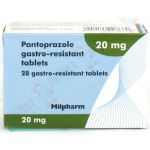People also ask
What is Pantoprazole?
Pantoprazole contains the active substance pantoprazole. Pantoprazole is a selective "proton pump" inhibitor, a medicine that reduces the amount of acid produced in your stomach. It is used to treat stomach and intestinal acid-related diseases.
How does it work?
Pantoprazole is a substituted benzimidazole that inhibits the secretion of hydrochloric acid in the stomach by specifically blocking the proton pump from parietal cells.
Pantoprazole is transformed into its active form in the secretory canaliculus of parietal cells where it inhibits the enzyme H + / K + ATPase, that is, in the final stage of the production of hydrochloric acid in the stomach. Inhibition is dose-dependent and affects both basal and stimulated acid secretion.
In most patients, the cessation of symptoms is reached in two weeks. Like other proton pump inhibitors and H2 receptor antagonists, treatment with pantoprazole results in decreased acidity in the stomach and therefore an increase in gastrin proportional to decreased acidity. The increase in gastrin is reversible. Since pantoprazole binds to the enzyme in a distal area at the level of the cellular receptor, it can inhibit the secretion of hydrochloric acid independently of the stimulation by other substances (acetylcholine, histamine, and gastrin). The effect is the same whether it is administered intravenously or orally.
What are the benefits of taking it?
Pantoprazole uses include treating adults and adolescents from 12 years of age to treat:
Reflux esophagitis. It is an inflammation of your esophagus (the tube that connects your throat to your stomach) accompanied by regurgitation of acid from the stomach.
Pantoprazole is used in adults to treat:
infection of a bacterium called Helicobacter pylori in patients with a stomach and / or duodenal ulcer in combination with two antibiotics (eradication treatment). The goal is to get rid of the bacteria and thus reduce the chance of ulcers coming back, stomach and duodenal ulcer, and, Zollinger-Ellison syndrome and other conditions in which too much acid is produced in the stomach.
How do I use it and its dosage?
Always use this Gastrointestinal medicine exactly as your doctor or pharmacist has told you. If in doubt, consult your doctor or pharmacist again.
Administration form
Take the tablets whole, without chewing or crushing, with the help of a little water, 1 hour before a meal.
The recommended dose is.
Adults and adolescents from 12 years
For the treatment of reflux esophagitis
The usual dose is one tablet a day. Your doctor may prescribe an increase to 2 tablets a day. The time of reflux esophagitis treatment is usually between 4 and 8 weeks. Your doctor will tell you how long to take this medicine.
For the treatment of an infection with a bacterium called Helicobacter pylori in patients with a stomach and/or duodenal ulcer in combination with two antibiotics (eradication treatment)
One tablet twice daily plus the two antibiotic tablets, either amoxicillin, clarithromycin, and metronidazole (or tinidazole), each should be taken twice daily with its pantoprazole tablet. Take the first pantoprazole tablet 1 hour before breakfast and the second 1 hour before dinner. Follow your doctor's instructions and be sure to read the package insert for antibiotics.
The duration of treatment is normally one to two weeks.
For the treatment of stomach and duodenal ulcers
The usual dose is one tablet a day. The dose may be doubled by your doctor.
Your doctor will tell you how long to take this medicine for. The duration of treatment of stomach ulcers is usually between 4 and 8 weeks. The duration of treatment of duodenal ulcers is normally between 2 and 4 weeks.
For long-term treatment of Zollinger-Ellison Syndrome and other conditions in which increased acid secretion from the stomach occurs
The recommended starting dose is two tablets a day.
Take the two tablets 1 hour before a meal. Subsequently, your doctor may adjust the dose, depending on the amount of acid secretion produced. If you are prescribed more than two tablets a day, you should take the tablets divided twice a day.
If you are prescribed more than four tablets a day, you will be told exactly when you should finish the treatment.
Renal insufficiency
If you have kidney problems, you should not take pantoprazole for Helicobacter pylori removal.
Liver failure:
If you have severe liver problems, you should not take more than one 20 mg pantoprazole tablet per day (in this case 20 mg pantoprazole tablets are available).
If you have moderate or severe liver problems, you should not take Pantoprazole for Helicobacter pylori removal.
Use in children and adolescents
The use of these tablets is not recommended in children under 12 years of age.
Side effects & precautions
Like all medicines, this medicine can cause side effects, although not everybody gets them.
If you experience any of the following side effects, stop taking these tablets and tell your doctor immediately, or contact the nearest hospital emergency department.
Severe allergic reactions (rare frequency: may affect up to 1 in 1,000 people): swelling of the tongue and/or throat, difficulty swallowing, rash (urticaria), difficulty breathing, swelling of the face of allergic origin (Quincke's edema/angioedema), severe dizziness with a very fast heartbeat and heavy sweating.
Serious skin disorders (frequency not known: cannot be estimated from the available data): blisters on the skin and a rapid deterioration of the general conditions, erosion (including slight bleeding) of the eyes, nose, mouth/lips or genitalia (Stevens-Johnson Syndrome, Lyell Syndrome, Erythema multiforme) and sensitivity to light.
Other serious conditions (frequency not known: cannot be estimated from the available data): yellowing of the skin and whites of the eyes (severe liver cell damage, jaundice), or fever, rash, enlargement Kidney pain with occasional urination and lower back pain (severe inflammation of the kidneys), possibly leading to kidney failure.
Other possible side effects are:
Common (may affect up to 1 in 10 people):
- Benign polyps in the stomach.
Uncommon (may affect up to 1 in 100 people):
- headache; dizziness; diarrhea; feeling dizzy, vomiting; bloating and flatulence (gas); constipation; dry mouth; pain and discomfort in the abdomen; skin rash, rash, rash; tingle; feeling weak, tired, or generally unwell; sleep disturbances, hip, wrist and spinal fracture
Rare (may affect up to 1 in 1,000 people):
- alteration or complete loss of sense of taste, vision disturbances such as: blurred vision; urticaria; joint pain; Muscle pain; weight changes; increased body temperature; fever, swelling in the extremities (peripheral edema); allergic reactions; depression; increase in the size of the breasts in men.
Very rare (may affect up to 1 in 10,000 people):
Frequency not known (cannot be estimated from the available data):
- Hallucination, confusion (especially in patients with a history of these symptoms)
- Decreased sodium levels in the blood, decreased magnesium levels in the blood, tingling, stinging, numbness, burning or numbness, rash, possibly with joint pain, inflammation of the large intestine causing persistent watery diarrhea.
Buying Pantoprazole online.
You can buy Pantoprazole online through one of the UK’s leading online pharmacies, Pharmacy Planet. It's easy and convenient. You will need to fill out a short assessment and the item will be delivered directly to your door. If you want to buy this Gastroinstinal Medication online, use Pharmacy Planet, a UK pharmacy you can trust.














